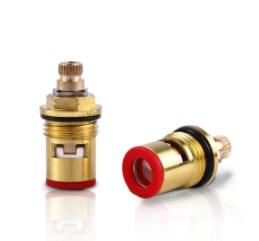The sealing performance of a valve is a critical factor in determining the efficiency and reliability of fluid control systems. In this context, Ceramic Valve Core has emerged as a preferred choice for its exceptional sealing capabilities. The unique properties of ceramic materials, such as their hardness, chemical inertness, and resistance to wear, make Ceramic Valve Cores an ideal choice for applications where sealing integrity is paramount.
One of the primary advantages of Ceramic Valve Cores is their ability to maintain a tight seal even under fluctuating pressures and temperatures. The hardness of ceramic materials ensures that the sealing surfaces remain undamaged and maintain their shape over time, thus providing a consistent and reliable seal. This is particularly important in high-pressure applications where the valve core is subjected to continuous stress and strain.
Another aspect of the sealing performance of Ceramic Valve Cores is their resistance to chemical corrosion. Unlike metal valve cores, which can be susceptible to corrosion and pitting, Ceramic Valve Cores do not react with most chemicals, ensuring that the sealing surfaces remain smooth and free from defects. This resistance to chemical attack is especially beneficial in applications involving aggressive or corrosive fluids, such as in the chemical processing and petrochemical industries.
The wear resistance of Ceramic Valve Cores is another factor that contributes to their sealing performance. The low coefficient of friction of ceramic materials reduces the wear on the sealing surfaces, prolonging the life of the valve and ensuring that the seal remains effective over an extended period. This is particularly important in applications where the valve is subjected to frequent operation, as the reduced wear extends the maintenance intervals and reduces the overall lifecycle costs.
Furthermore, the precision manufacturing processes used to produce Ceramic Valve Cores ensure that the sealing surfaces are machined to tight tolerances, contributing to consistent and reliable sealing performance. The use of advanced ceramics, such as zirconia or alumina, allows for the production of valve cores with high dimensional accuracy and surface finish, further enhancing their sealing capabilities.
In addition to their inherent material properties, the design of Ceramic Valve Cores also plays a crucial role in their sealing performance. The use of advanced sealing technologies, such as soft-seating or metal-to-metal sealing, can be combined with ceramic material to provide a customized solution for specific applications. This flexibility in design allows for the optimization of the valve core to meet the unique requirements of each application, ensuring optimal sealing performance.
The maintenance of Ceramic Valve Cores is another factor that contributes to their sealing performance. Due to their resistance to corrosion and wear, Ceramic Valve Cores require less frequent maintenance compared to metal valve cores. This not only reduces the downtime associated with maintenance but also ensures that the valve remains in optimal condition, maintaining its sealing performance over time.
In conclusion, the sealing performance of Ceramic Valve Cores is ensured through a combination of their inherent material properties, precision manufacturing processes, and advanced sealing technologies. Their ability to maintain a tight seal under varying conditions, resistance to chemical corrosion, and wear resistance make them a reliable choice for applications where sealing integrity is crucial. The precision engineering and design flexibility of Ceramic Valve Cores further enhance their sealing capabilities, providing a customized solution for a wide range of applications.

